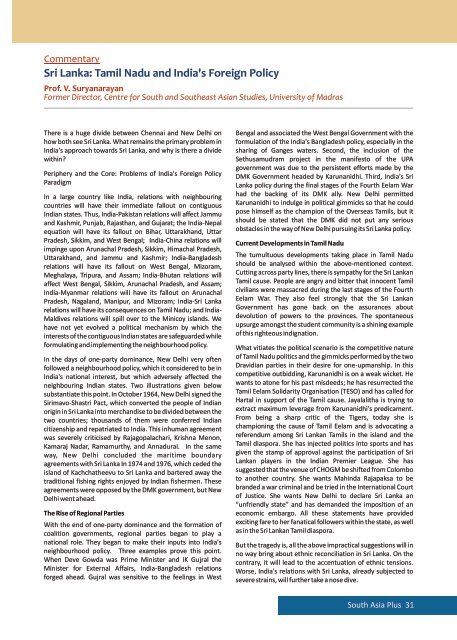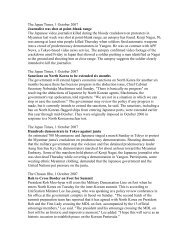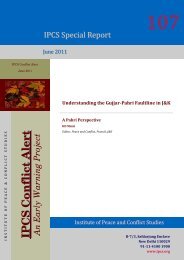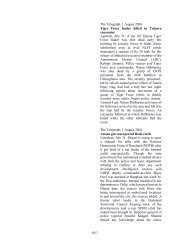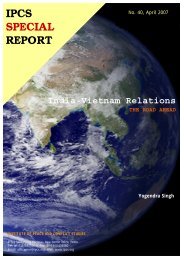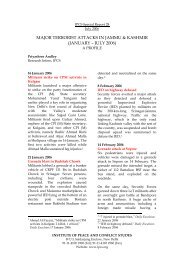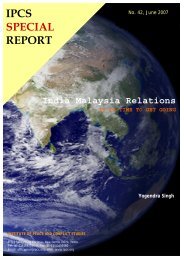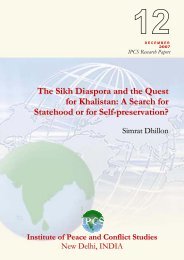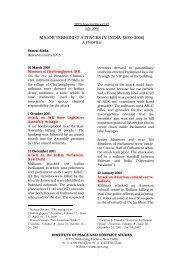April-June 2013 - Institute of Peace and Conflict Studies
April-June 2013 - Institute of Peace and Conflict Studies
April-June 2013 - Institute of Peace and Conflict Studies
Create successful ePaper yourself
Turn your PDF publications into a flip-book with our unique Google optimized e-Paper software.
Commentary<br />
Sri Lanka: Tamil Nadu <strong>and</strong> India's Foreign Policy<br />
Pr<strong>of</strong>. V. Suryanarayan<br />
Former Director, Centre for South <strong>and</strong> Southeast Asian <strong>Studies</strong>, University <strong>of</strong> Madras<br />
There is a huge divide between Chennai <strong>and</strong> New Delhi on<br />
how both see Sri Lanka. What remains the primary problem in<br />
India's approach towards Sri Lanka, <strong>and</strong> why is there a divide<br />
within?<br />
Periphery <strong>and</strong> the Core: Problems <strong>of</strong> India's Foreign Policy<br />
Paradigm<br />
In a large country like India, relations with neighbouring<br />
countries will have their immediate fallout on contiguous<br />
Indian states. Thus, India-Pakistan relations will affect Jammu<br />
<strong>and</strong> Kashmir, Punjab, Rajasthan, <strong>and</strong> Gujarat; the India-Nepal<br />
equation will have its fallout on Bihar, Uttarakh<strong>and</strong>, Uttar<br />
Pradesh, Sikkim, <strong>and</strong> West Bengal; India-China relations will<br />
impinge upon Arunachal Pradesh, Sikkim, Himachal Pradesh,<br />
Uttarakh<strong>and</strong>, <strong>and</strong> Jammu <strong>and</strong> Kashmir; India-Bangladesh<br />
relations will have its fallout on West Bengal, Mizoram,<br />
Meghalaya, Tripura, <strong>and</strong> Assam; India-Bhutan relations will<br />
affect West Bengal, Sikkim, Arunachal Pradesh, <strong>and</strong> Assam;<br />
India-Myanmar relations will have its fallout on Arunachal<br />
Pradesh, Nagal<strong>and</strong>, Manipur, <strong>and</strong> Mizoram; India-Sri Lanka<br />
relations will have its consequences on Tamil Nadu; <strong>and</strong> India-<br />
Maldives relations will spill over to the Minicoy isl<strong>and</strong>s. We<br />
have not yet evolved a political mechanism by which the<br />
interests <strong>of</strong> the contiguous Indian states are safeguarded while<br />
formulating <strong>and</strong> implementing the neighbourhood policy.<br />
In the days <strong>of</strong> one-party dominance, New Delhi very <strong>of</strong>ten<br />
followed a neighbourhood policy, which it considered to be in<br />
India's national interest, but which adversely affected the<br />
neighbouring Indian states. Two illustrations given below<br />
substantiate this point. In October 1964, New Delhi signed the<br />
Sirimavo-Shastri Pact, which converted the people <strong>of</strong> Indian<br />
origin in Sri Lanka into merch<strong>and</strong>ise to be divided between the<br />
two countries; thous<strong>and</strong>s <strong>of</strong> them were conferred Indian<br />
citizenship <strong>and</strong> repatriated to India. This inhuman agreement<br />
was severely criticised by Rajagopalachari, Krishna Menon,<br />
Kamaraj Nadar, Ramamurthy, <strong>and</strong> Annadurai. In the same<br />
way, New Delhi concluded the maritime boundary<br />
agreements with Sri Lanka In 1974 <strong>and</strong> 1976, which ceded the<br />
isl<strong>and</strong> <strong>of</strong> Kachchatheevu to Sri Lanka <strong>and</strong> bartered away the<br />
traditional fishing rights enjoyed by Indian fishermen. These<br />
agreements were opposed by the DMK government, but New<br />
Delhi went ahead.<br />
The Rise <strong>of</strong> Regional Parties<br />
With the end <strong>of</strong> one-party dominance <strong>and</strong> the formation <strong>of</strong><br />
coalition governments, regional parties began to play a<br />
national role. They began to make their inputs into India's<br />
neighbourhood policy. Three examples prove this point.<br />
When Deve Gowda was Prime Minister <strong>and</strong> IK Gujral the<br />
Minister for External Affairs, India-Bangladesh relations<br />
forged ahead. Gujral was sensitive to the feelings in West<br />
Bengal <strong>and</strong> associated the West Bengal Government with the<br />
formulation <strong>of</strong> the India's Bangladesh policy, especially in the<br />
sharing <strong>of</strong> Ganges waters. Second, the inclusion <strong>of</strong> the<br />
Sethusamudram project in the manifesto <strong>of</strong> the UPA<br />
government was due to the persistent efforts made by the<br />
DMK Government headed by Karunanidhi. Third, India's Sri<br />
Lanka policy during the final stages <strong>of</strong> the Fourth Eelam War<br />
had the backing <strong>of</strong> its DMK ally. New Delhi permitted<br />
Karunanidhi to indulge in political gimmicks so that he could<br />
pose himself as the champion <strong>of</strong> the Overseas Tamils, but it<br />
should be stated that the DMK did not put any serious<br />
obstacles in the way <strong>of</strong> New Delhi pursuing its Sri Lanka policy.<br />
Current Developments in Tamil Nadu<br />
The tumultuous developments taking place in Tamil Nadu<br />
should be analysed within the above-mentioned context.<br />
Cutting across party lines, there is sympathy for the Sri Lankan<br />
Tamil cause. People are angry <strong>and</strong> bitter that innocent Tamil<br />
civilians were massacred during the last stages <strong>of</strong> the Fourth<br />
Eelam War. They also feel strongly that the Sri Lankan<br />
Government has gone back on the assurances about<br />
devolution <strong>of</strong> powers to the provinces. The spontaneous<br />
upsurge amongst the student community is a shining example<br />
<strong>of</strong> this righteous indignation.<br />
What vitiates the political scenario is the competitive nature<br />
<strong>of</strong> Tamil Nadu politics <strong>and</strong> the gimmicks performed by the two<br />
Dravidian parties in their desire for one-upmanship. In this<br />
competitive outbidding, Karunanidhi is on a weak wicket. He<br />
wants to atone for his past misdeeds; he has resurrected the<br />
Tamil Eelam Solidarity Organisation (TESO) <strong>and</strong> has called for<br />
Hartal in support <strong>of</strong> the Tamil cause. Jayalalitha is trying to<br />
extract maximum leverage from Karunanidhi's predicament.<br />
From being a sharp critic <strong>of</strong> the Tigers, today she is<br />
championing the cause <strong>of</strong> Tamil Eelam <strong>and</strong> is advocating a<br />
referendum among Sri Lankan Tamils in the isl<strong>and</strong> <strong>and</strong> the<br />
Tamil diaspora. She has injected politics into sports <strong>and</strong> has<br />
given the stamp <strong>of</strong> approval against the participation <strong>of</strong> Sri<br />
Lankan players in the Indian Premier League. She has<br />
suggested that the venue <strong>of</strong> CHOGM be shifted from Colombo<br />
to another country. She wants Mahinda Rajapaksa to be<br />
br<strong>and</strong>ed a war criminal <strong>and</strong> be tried in the International Court<br />
<strong>of</strong> Justice. She wants New Delhi to declare Sri Lanka an<br />
“unfriendly state” <strong>and</strong> has dem<strong>and</strong>ed the imposition <strong>of</strong> an<br />
economic embargo. All these statements have provided<br />
exciting fare to her fanatical followers within the state, as well<br />
as in the Sri Lankan Tamil diaspora.<br />
But the tragedy is, all the above impractical suggestions will in<br />
no way bring about ethnic reconciliation in Sri Lanka. On the<br />
contrary, it will lead to the accentuation <strong>of</strong> ethnic tensions.<br />
Worse, India's relations with Sri Lanka, already subjected to<br />
severe strains, will further take a nose dive.<br />
South Asia Plus 31


